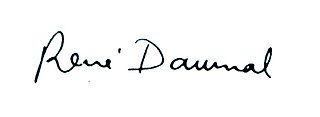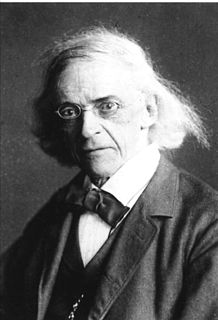A Quote by George Spencer-Brown
Thus we cannot escape the fact that the world we know is constructed in order to see itself. This is indeed amazing. Not so much in view of what it sees, although this may appear fantastic enough, but in respect of the fact that it can see at all. But in order to do so, evidently it must first cut itself up into a least one state which sees, and at least one other state which is seen.
Related Quotes
You cannot stay on the summit forever; you have to come down again. So why bother in the first place? Just this: What is above knows what is below, but what is below does not know what is above. One climbs, one sees. One descends, one sees no longer, but one has seen. There is an art of conducting oneself in the lower regions by the memory of what one saw higher up. When one can no longer see, one can at least still know.
The universe is no narrow thing and the order within it is not constrained by any latitude in its conception to repeat what exists in one part in any other part. Even in this world more things exist without our knowledge than with it and the order in creation which you see is that which you have put there, like a string in a maze, so that you shall not lose your way. For existence has its own order and that no man’s mind can compass, that mind itself being but a fact among others.
Another discovery which came out of my investigation was the fact that when one gives his or her order to produce a definite result and stands by that order, it seems to have the effect of giving one what might be termed a second sight which enables him or her to see right through ordinary problems. What this power is I cannot say; all I know is that it exists and it becomes available only when one is in that state of mind in which he or she knows exactly what one wants and is fully determined not to quit until he or she finds it.
We no longer even understand the question whether change is by itself good or bad, ...We start out with the axiom that it is the norm. We do not see change as altering the order... We see change as being order itself - indeed the only order we can comprehend today is a dynamic, a moving, a changing one.
Like the eye which sees everything in front of it and never sees itself, faith is occupied with the Object upon which it rests and pays no attention to itself at all. While we are looking at God, we do not see ourselves - blessed riddance. The man who has struggled to purify himself and has had nothing but repeated failures will experience real relief when he stops tinkering with his soul and looks away to the perfect One.
When I have seen by Time's fell hand defaced The rich proud cost of outworn buried age; When sometime lofty towers I see down-razed And brass eternal slave to mortal rage; When I have seen the hungry ocean gain Advantage on the kingdom of the shore, And the firm soil win of the watery main, Increasing store with loss and loss with store; When I have seen such interchange of state, Or state itself confounded to decay; Ruin hath taught me thus to ruminate, That Time will come and take my love away. This thought is as a death which cannot choose But weep to have that which it fears to lose.
Family is a difficult matter. I must admit I do not know that the state can intervene successfully in a family. It's a fact that everything is connected with the individualist temperament, the kind of economic environment which stresses the individual, but this is not directly the result of a state policy, nor do I see any good way by which the state could intervene except in some marginal ways.
A real Christian in an odd number anyway. He feels supreme love for One whom he has never seen, talks familiarly every day to Someone he cannot see, expects to go to heaven on the virtue of Another, empties himself in order to be full, admits he is wrong so he can be declared right, goes down in order to get up, is strongest when he is weakest, richest when he is poorest, and happiest when he feels worst. He dies so he can live, forsakes in order to have, gives away so he can keep, sees the invisible, hears the inaudible, and knows that which passes knowledge.
It is, indeed, a fact that, in the midst of society and sociability every evil inclination has to place itself under such great restraint, don so many masks, lay itself so often on the procrustean bed of virtue, that one could well speak of a martyrdom of the evil man. In solitude all this falls away. He who is evil is at his most evil in solitude: which is where he is at his best - and thus to the eye of him who sees everywhere only a spectacle also at his most beautiful.


































